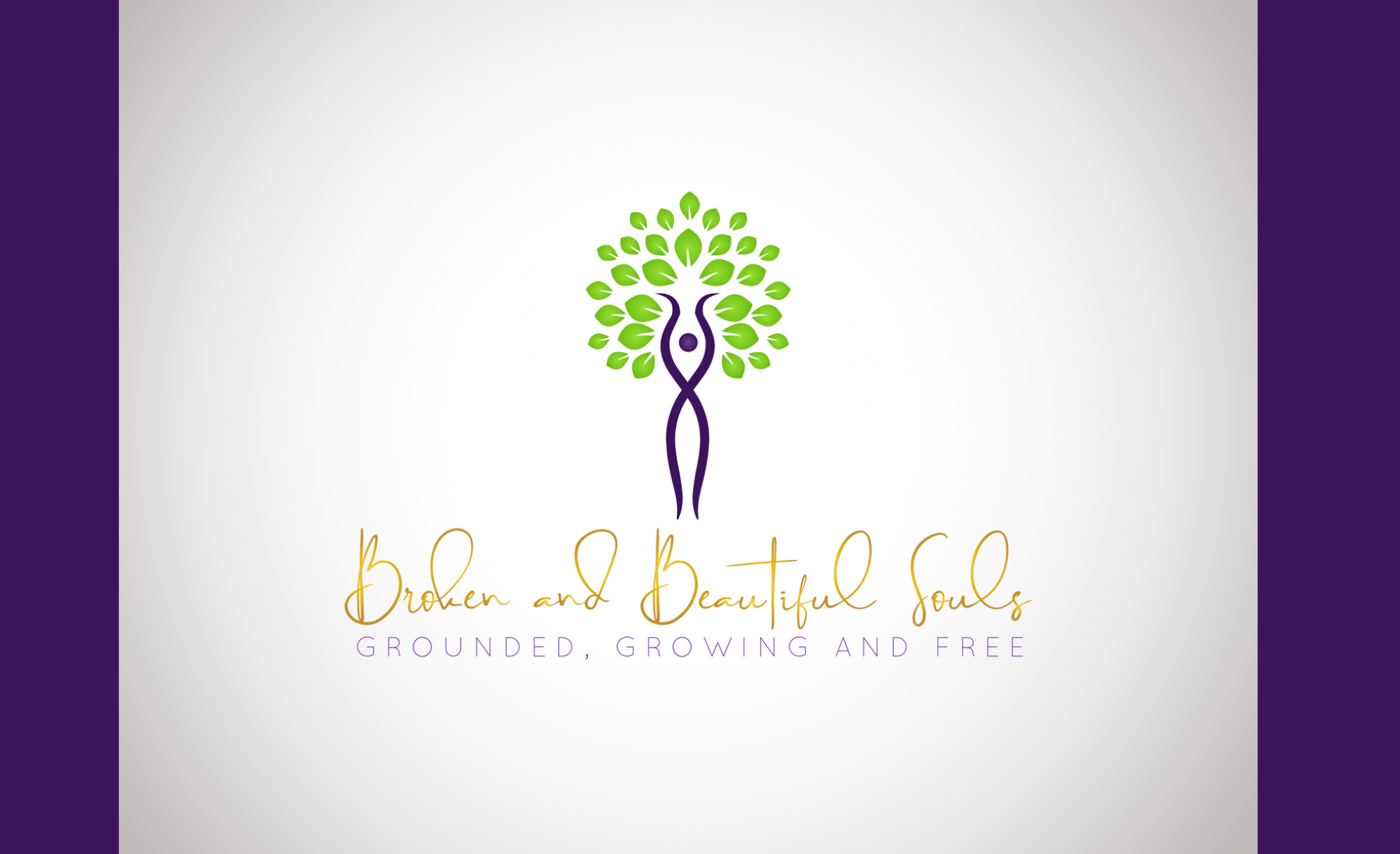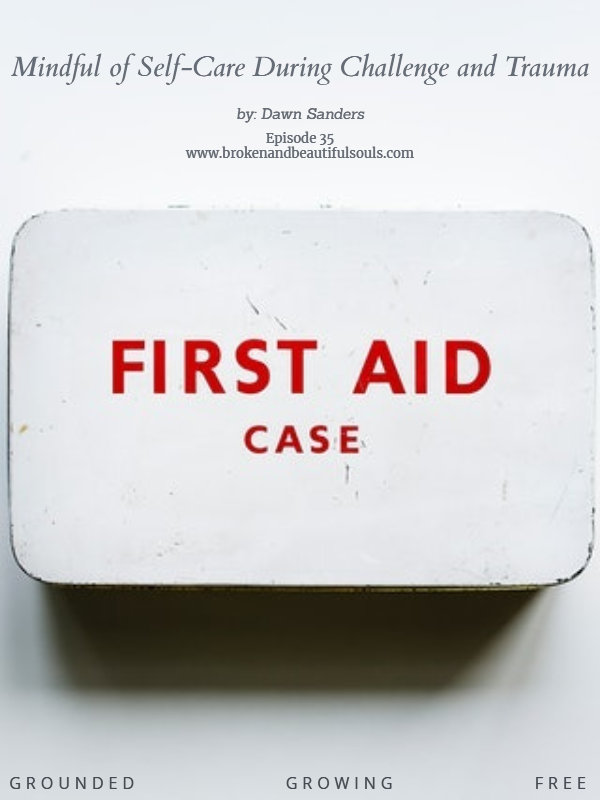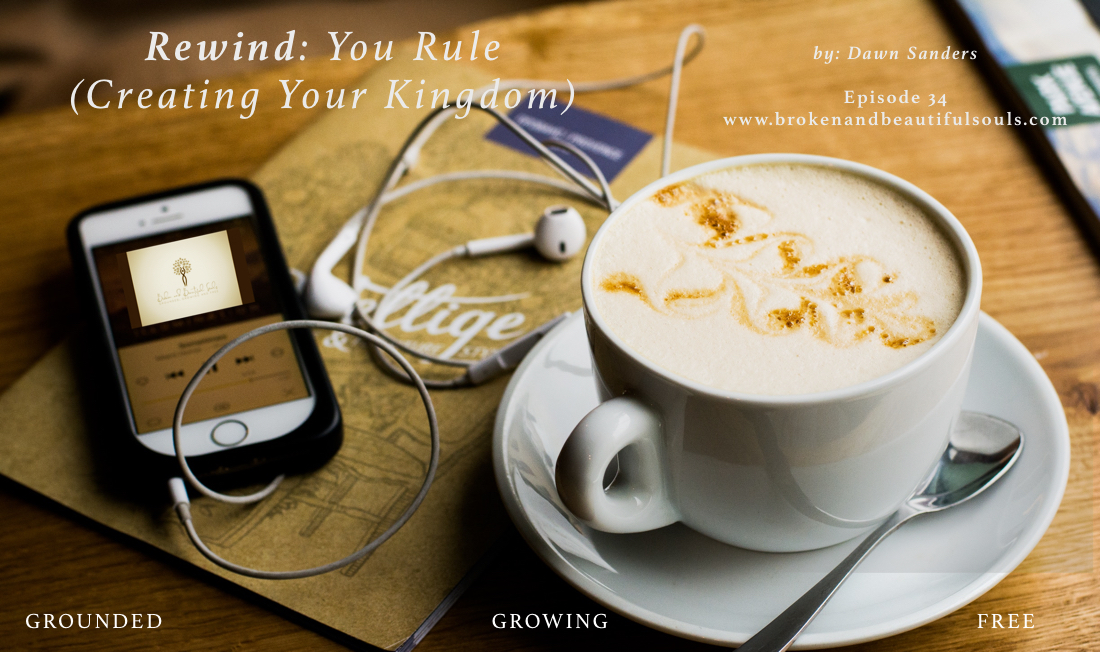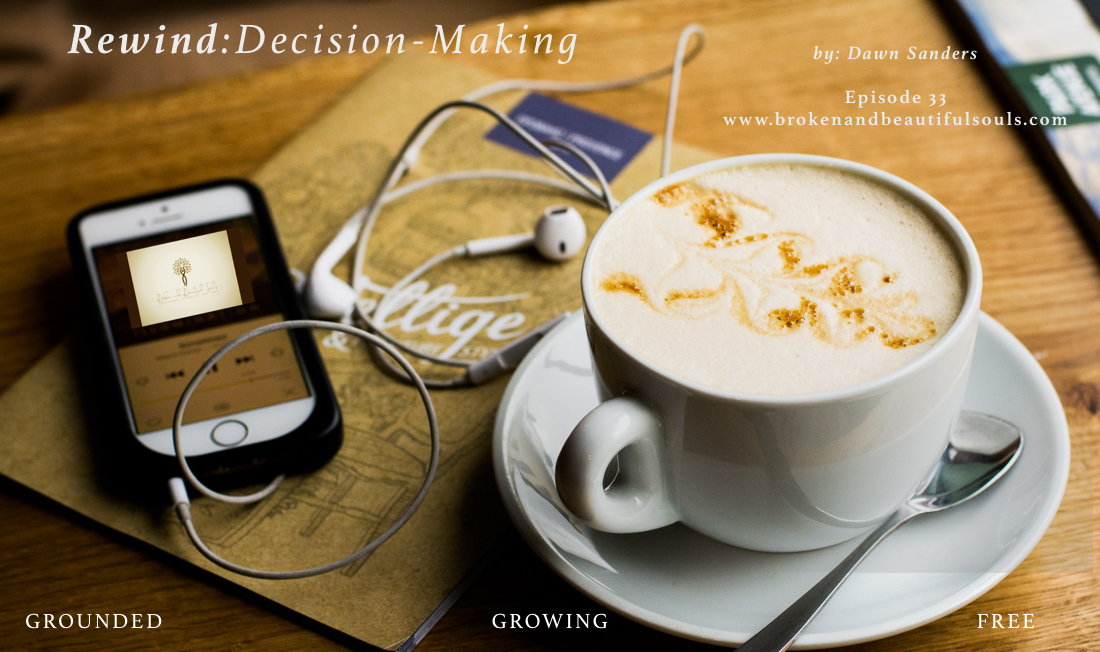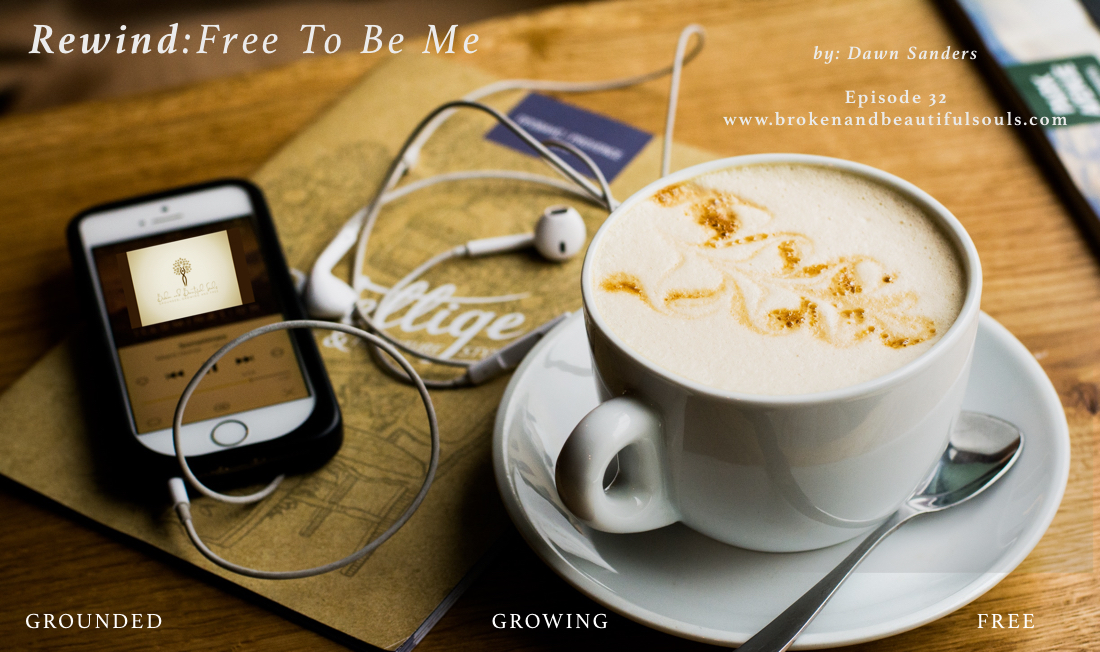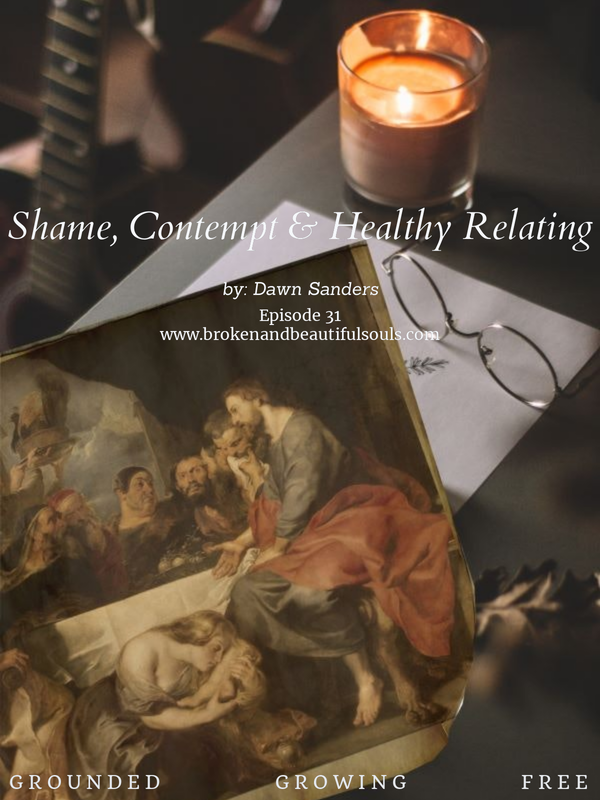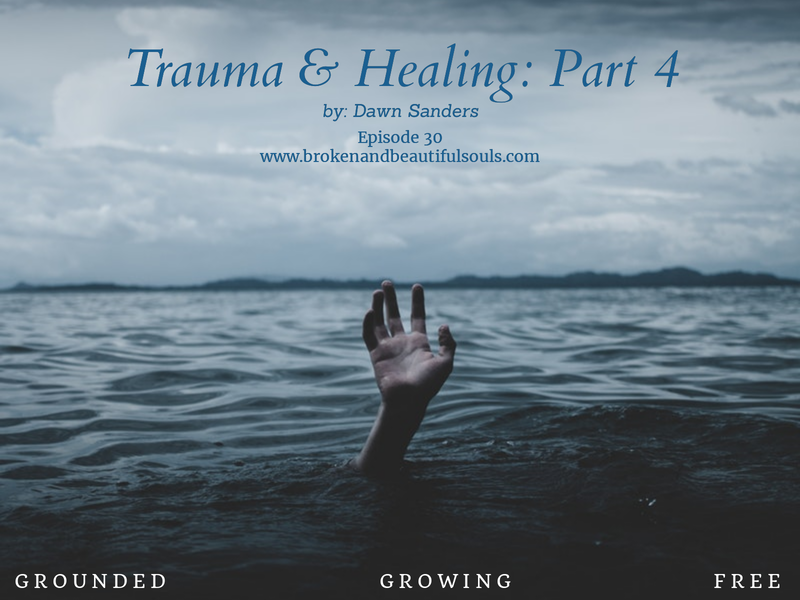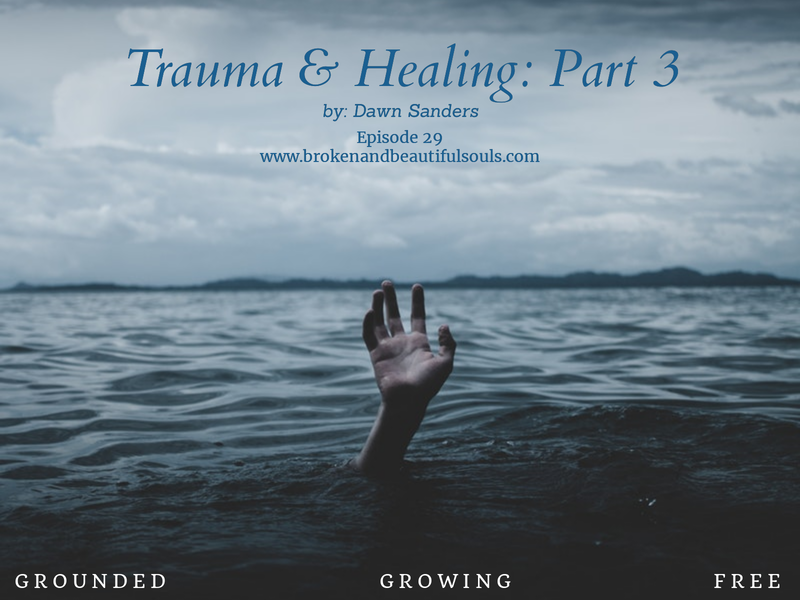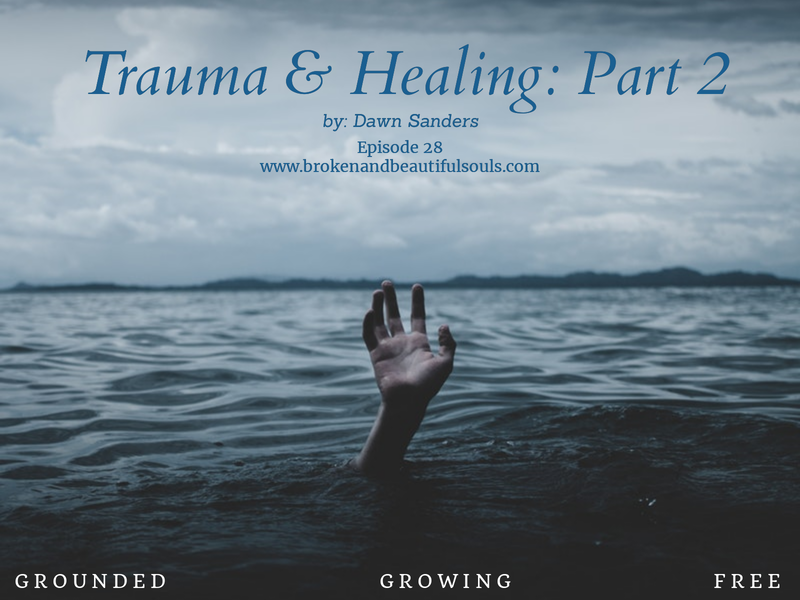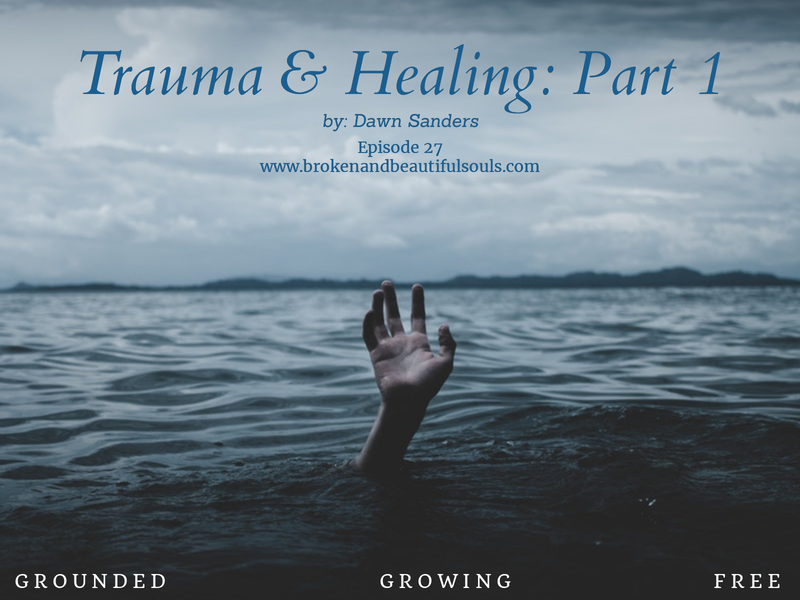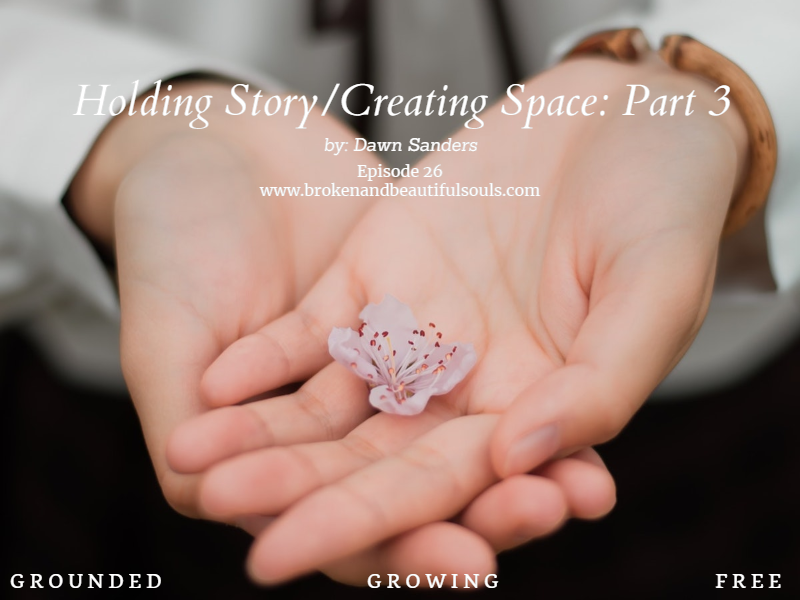Do you have a mindful plan for self-care to stay healthy and strong during times of challenge, transition and/or trauma? Have you ever woken up exhausted, wondering how you will even make it through the day and questioning if you could be diagnosed with burnout? Perhaps you are the type that just keeps pushing yourself and thinks, “but it is for a good cause,” unaware of how much the sacrifice is impacting your mind, body and soul. If you work or live in high stress situations or have experienced overwhelming challenge, transition or trauma, this series is for you. Learn to become aware of how your body responds to stress; and discover best practices for taking care of yourself in order to stay healthy and strong.
Episode 034: Rewind ~ You Rule (Creating Your Kingdom)
Unfortunately, Dawn’s summer cold has not been kind to her voice. In light of this self-care journey (and for the sake of being kind to her voice), Dawn thought it would be appropriate to rewind once again to the topic of Creating Your Kingdom. She hopes this episode will set the stage for being mindful of our unique kingdoms, what we grow in our gardens, and how we choose to care for said gardens.
Now is the time to take stock of your kingdom. All of who you are—your stories, ideas, beauty, body, brains, jobs, relationships, etc. is your kingdom, your castle. You are therefore, queen of your castle. You rule! Is your castle being protected as it should be? Is your well leaking water? Are you and those in your kingdom thriving or surviving? Join Dawn today in taking a closer look at your kingdom.
~~~~~~~~~~~~~~~
“Think like a queen. A queen is not afraid to fail. Failure is another stepping stone to greatness.” ~Oprah Winfrey
Show Notes:
=&1=&
You get the last word on who and what you let into your kingdom. Pay close attention to the ‘who’ and the ‘what’. Who and what you spend time with will leave a lasting impression on your life. Choose well.
Col 2:8; I Cor 6:19:20; Rom 12:2; Phil 4:8; I Cor 15:33
=&2=&
When considering the most basic of needs in Maslow’s ‘Hierarchy of Needs’, it’s common to leave one’s safety off the list of food, shelter, and safety. At the same time, you may realize around you that safety is a topic of considerable buzz and discussion. Have you ever considered what your ‘yes’ and ‘no’ will be in a given situation, with the purpose toward goodness~ the fruit of the Spirit? For example, ‘yes, I will water your garden while you are away if you give me a key to your garden well; no, I will not take responsibility for watering your garden from my well’. What skills are you developing to help protect your kingdom?
Gal 5:22-23; Rom 8:5; Prov 2:11
=&3=&
Often you will find yourself in seasons of giving or receiving. What season are you in currently? Maybe you find yourself giving more than you permit to come into your kingdom. Alternately, maybe you find yourself taking in more than you give from kingdom. What do you find yourself giving away to others? What do you find yourself taking in and receiving from others? Is there a balance? What are the Fair Trade investments of your kingdom? Consider what might be driving these truths. And lastly, consider with what in your life you need most help.
2 Cor 9:7; Rom 13:8; Rom 2:1; Gal 6:6-10; Prov 19:17; Prov 11: 24-25; John 3:16-17
=&4=&
In the kingdom of your life, what does the ‘pearl necklace’ you were given look like? Have you ever given away pearls, in retrospect, you wish you had kept closer to home? For the pearls you have managed to keep, how have you protected and cared for them? How will you wisely rule your kingdom moving forward?
Matt 7:6; Prov 4:6; James 1:5; Prov 3:13-18; Prov 1:7
Episode 033: Rewind ~ Decision-Making (Ruminate or Release?)
1. There is likely more at play and involved when you have difficulty making a decision.
Your story or narrative communicates a lot about the reason(s) you may find yourself stuck in the decision making process
Is 43:1; I King 18:21; Rom 14:15; James 1:6
2. Pay attention to your feelings~ what is going on in your body and what your emotions are as you try to make a decision. Paying attention to the context or path you are on and headed toward could actually provide some clues as to the direction you may need to take.
Prov 2:2-6; Prov 26:11; Prov 17:10
3. Strategic Approach:
a. Create a variety of lists during your decision making process:
Episode 032: Rewind ~ Free To Be Me (The Comparison Game)
In honor of celebrating God’s creation of the amazing feminine, I have decided to take this week and focus on support and care for my own body. I also celebrate you and thank you for downloading your podcast favorites. Today, listen in to “Free To Be Me.”
Episode 031: Shame, Contempt & Healthy Relating
CLICK HERE FOR YOUR FREE PDF ~ The Relationship Grid
Your own shame and contempt negatively impact relationship and prevent intimacy. Today’s podcast is an excerpt from a teaching Dawn shared at a Spiritual Nurture Retreat in Europe. In this talk she references a chart adapted from Terry Real’s book, The New Rules of Marriage,
Episode 030: Trauma and Healing ~ Part 4 (Interview with Lara)
For the one experiencing it, unnamed Secondary Trauma/Vicarious Trauma often results in more harm. Listen to an interview with Lara to hear what she has learned about her own secondary trauma and what has blossomed out of her own brokenness.
~~~~~~~~~~~~~~~
“The seed breaks to give us wheat. The soil breaks to give us the crop. The sky breaks to give us the rain. And the wheat breaks to give us the bread. The bread breaks to give us the feast. There was once an alabaster jar that broke to give Him the glory. Never be afraid to be a broken thing.” ~Ann Voskamp
Show Notes:
Dawn is joined by Lara today. Lara and her sister were born in Scotland and moved to Raleigh as children with their family. Lara lives in Raleigh, NC with her husband and their daughter. She received her degree in Nursing at UNC-W and has practiced the past 10 years in the areas of labor/delivery and pediatrics, while developing an interest in SANE- Sexual Assault Nurse Examiner Nursing. This growing interest is an important part of Lara’s history, as it has allowed her to be able to administer, work with, and relate to women who have had traumatic experiences.
In 2016, the trauma of sexual assault became personal for her. Since that time, Lara and her sister have felt called to carry the torch of support for sexual assault survivors. They plan to do this ‘one tote at a time’ through their non-profit, Layers of Dignity.
Dawn and Lara discuss:
- Lara’s personal experience with Secondary Trauma and the struggles she faced
- That Secondary Trauma is a REAL ‘thing’ and there is no justice for the victim
- How turning anger into action helped she and her sister start their nonprofit, Layers of Dignity
Episode 029: Trauma and Healing ~ Part 3 (Secondary Trauma)
Secondary Trauma, also known as Vicarious Trauma, is the lesser known sibling of trauma. A secondary trauma victim rarely understands why she feels disrupted; she feels as if her body has been hijacked. It is terribly confusing for the brain to sort this out when the direct trauma(s) did not happen to the helper or observer. Join Dawn today as she helps to unravel the unique features of Secondary Trauma.
~~~~~~~~~~~~~~~
“Who knows why God allows heartbreak, but the answer must be important because God allows His heart to break too.” ~Ann Voskamp
Show Notes:
Like primary trauma, Secondary trauma comes in various sizes, forms and packages.
Secondary Trauma
- Defined:
“a deeply distressing or disturbing experience.” ~Dawn’s dictionary
“indirect exposure to trauma through a first-hand account or a narrative of a traumatic event.” ~Psychiatric Times
Episode 028: Trauma and Healing ~ Part 2
Trauma impacts us physically, mentally, emotionally and spiritually. Listen as Dawn continues to walk us through an example from her own story, how she was impacted and what helped to bring about healing.
~~~~~~~~~~~~~~~
“Our brains continually form maps of the world – maps of what is safe and what is dangerous.” ~Bessel van der Kolk
Show Notes:
Trauma continued:
Disclaimer: Dawn’s podcasts are meant to teach, train, inform and even, encourage. They are not meant to replace personal therapy, when needed.
Episode 027: Trauma and Healing ~ Part 1
What is trauma and how does it impact us physically, mentally, emotionally and spiritually? Dawn walks through an example from her own story of how she was impacted by a traumatic event and what helped to bring about healing.
~~~~~~~~~~~~~~~
“The big issue for traumatized people is that they didn’t own themselves anymore. Any loud sound, anybody insulting them… can hijack them away from themselves. And, so what we have learned is that what makes you resilient in trauma is to own yourself fully.” ~Bessel van der Kolk
Episode 026: Holding Story/Creating Space ~ Part 3 (Interview with Lindsey)
An interview with Lindsey gives us a glorious example of risk and determination to equip her church with the ability to hold stories, even trauma stories, well. Learn what to avoid and how to hold stories in relationship with skill and honor.
~~~~~~~~~
“In a profound way, our intentionality is a key ingredient in determining whether we notice God everywhere, or only in church, or only in suffering, or nowhere. It all depends on how we choose to fashion our world.”
~ Elizabeth Dryer
Show Notes:
Lindsey was born in Virginia and graduated with a bachelor’s degree in Education. She was a missionary to China and Vietnam, teaching English as a second language. Along the way, she was forced to deal with some difficult situations. With a heart for bringing dignity out of painful situations, Lindsey embarked upon a journey of bringing light into her own story, while having the opportunity to influence and love on a larger ‘audience’ by offering tangible, loving, supportive and timely nuggets of truth and learning.
Dawn and Lindsey discuss:
